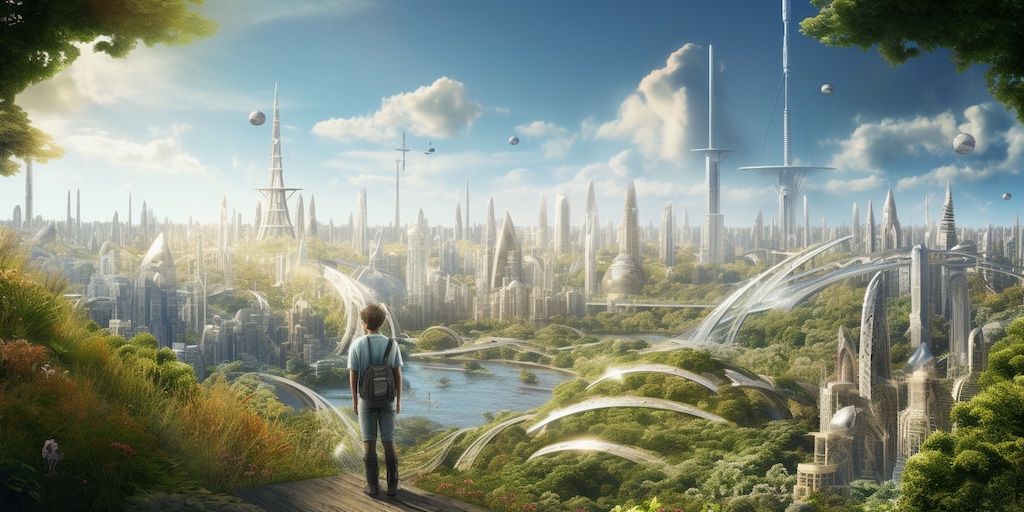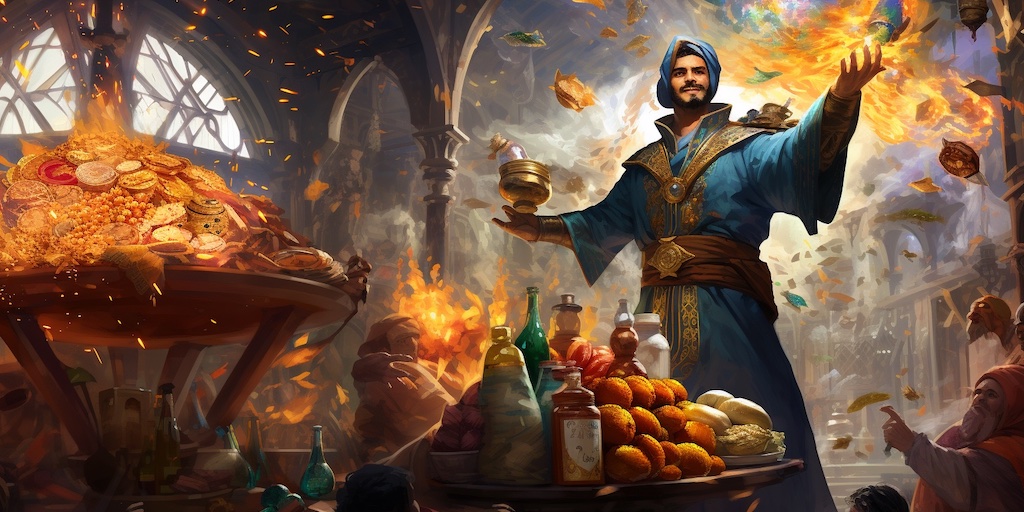Inspired by 80’s sci-fi, Elon Musk envisions a world without work where AI acts like a magic Genie. But how realistic is a post scarcity society, and how do we get from now to this abundant future?

With artificial general intelligence moving from the realm of sci-fi to reality, big thinkers are grappling with the potential consequences. The optimists predict the disappearance of work and need, what is being described as a post-scarcity society. Among them is Elon Musk.
Sunak & Musk at the AI Safety Summit
The British Government recently held an AI Safety Summit at Bletchley Park in Buckinghamshire, a carefully chosen location, given its historical significance to artificial intelligence.
Bletchley Park is where a team of mathematicians, including Alan Turing, built Colossus, a prototype computer which decrypted the Nazi’s Enigma code and proved pivotal to the Allied victory in World War II.
Eighty years later, the great and the good of the tech community, the headliner being Elon Musk, gathered to discuss a very different threat – artificial intelligence.
Elon Musk’s definition of a post-scarcity society
There was a general consensus at the Summit on the threat AI might pose, given the exponential growth in the power of large language models like ChatGPT and the need for guard rails.
But what the media focused most on were some soundbite statements Musk made in an interview with British Prime Minister Rishi Sunak about the benefits AI might bring.
“A future of abundance where there is no scarcity of goods and services…There will come a point where no job is needed...We won’t have Universal Basic Income we’ll have Univeral High Income
Elon Musk interviewed by Rishi Sunak at the AI Safety Summit, Nov 3rd, 2023
Musk’s comments provide a general idea of what a post-scarcity society might look like. We’ll want for nothing; everyone will be equally wealthy; inequality or poverty will be removed; no human will have to work unless they choose to. Who wouldn’t sign up for that?
Elon Musk’s inspiration for a post-scarcity society
What was missing from Elon’s cosy chat with Rishi Sunak was any detail to justify his claims or timeline other than saying that we’re now on the exponential part of the AI development S-Curve.
It’s safe to assume that a circular economy will be part of that abundant future and pulling resources from beyond Earth.
The boss of X, Tesla, and SpaceX did provide some explanation as to what shaped his vision of the post-scarcity future – a collection of sci-fi books, The Culture Series, by Scottish novelist Iain Banks.
I recommend people read Iain Banks, I’m a really big fan…Banks books are the best envisioning of an AI future.
Elon Musk interviewed by Rishi Sunak at the AI Safety Summit, Nov 3rd, 2023
What’s surprising about the vision Musk references for a technology that is developing so rapidly is that Banks was born in 1953 and started writing The Culture Series before the internet as we know it even existed.
Banks sadly died in 2013, so we can’t ask him how he feels about his fantasy world becoming the blueprint for an abundant future. There are, however, clues within the books that suggest that there is more nuance to his ideas than Elon’s eulogy suggests.
Is the Culture Series a realistic blueprint for a post-scarcity society
The Culture Series depicts a future of abundance, where all of society’s heavy lifting (work, governance and security) is provided by powerful sentient AI known as Minds.
Through the central human characters, we learn that having ceded control to AI, people are free in other ways.
They are free to change sex as they choose, to absorb one of 300 synthetic drugs designed to heighten experiences and largely free of the threat of dying.
Living in a culture where robots do all the work might sound appealing, but the power the Minds possess – both soft and hard – still creates tensions and tradeoffs.
The Culture had theoretical total freedom of information; the catch was that consciousness was private, and information held in a Mind…was regarded as part of the Mind’s being, and so as sacrosanct as the contents of a human brain; a Mind could hold any set of facts and opinions it wanted without having to tell anybody what it knew or thought, or why.
The Player of Games, Iain M Banks, book three in The Culture Series
In The Culture, everyone has a helpful drone following them about and protecting them if necessary, but that also means that in an abundant future, privacy will be rare, if not impossible.
Banks doesn’t explain how any of this came about, and no reasonable reader could criticise him for that.
The Culture Series books aren’t instruction manuals but allegorical sci-fi fantasies. Though set in a post-scarcity future 2,000 years from now, they present dilemmas that aren’t structurally too dissimilar to those we struggle with today.
So, if The Culture is just a distant vision of what a post-scarcity society might look like, how do we get there?
How realistic is the vision of a post-scarcity society?
It’s hard to imagine how we get from the current global inequality of wealth, virulent culture wars, and Tragedy of the Commons style depletion of natural resources to a vision of limitless harmony.
Iain Banks’ vision of an abundant future is definitely in the minority compared to the more common Mad Max-style dystopian blueprint of scarce resources combined with abundant violence and misery.
You might argue that you can’t make an infinite omelette without breaking eggs.
Previous technological revolutions produced short-term disruption but longer-term economic growth. Jobs and industries disappeared but were eventually replaced by occupations that previously didn’t exist, an argument Sunak made in his conversation with Musk.
A similar scenario is predicted for AI, but is it enough that robots might deliver a bigger overall pie if we all get a smaller slice?
Squaring inequality today with the dream of abundance for all tomorrow
The previous technology revolutions may have delivered growth, but they also created more inequality, not less.
Despite its name, the Gilded Age (1877-1900) was characterised by growing disparities in wealth. The dotcom boom (1995-2000) made plenty of tech billionaires yet exacerbated the gap between have’s and have-nots.
Musk talked about an AI Genie doing all the grunt work, but the Gini Coefficient – a measure of inequality – shows previous technological revolutions haven’t levelled the playing field.
A recent IMF Study suggests that 40% of global employment is exposed to Artificial Intelligence, rising to 60% for advanced economies.
Historically, automation and information technology have tended to affect routine tasks, but one of the things that sets AI apart is its ability to impact high-skilled jobs. As a result, advanced economies face greater risks from AI…about 60 percent of jobs may be impacted by AI.
Internation Monetary Fund, January 2024
On top of this, rent-seeking and the Cantillon effect still dominate, but another AI visionary has a plan for that. Sort of.
Worldcoin & the vague promise of UBI
Sam Altmann, the on-off-on CEO of OpenAI, isn’t just responsible for ChatGPT but a side project called WorldCoin.
WorldCoin plans to become the world’s largest digital identity and financial network to the benefit of humanity as a whole.
This sounds like one step along the path to an abundant future. An AI-generated Universal Basic Income (UBI), which may eventually develop into Elon’s vision of Universal High Income (UHI).
Unfortunately, WorldCoin’s website provides no detail of exactly how this vision will be realised.
All we know is that blockchain technology is involved and scanning people’s retinas in return for a cryptocurrency called WLD. The limited detail provokes more questions (and privacy concerns) than answers.
And the WLD path to post-scarcity is even harder to navigate because cryptocurrencies, chief of all Bitcoin, derive their value from unforgeable scarcity and fixed supplies, not abundance.
Even allowing for that, cryptocurrencies share roughly the same distribution patterns as the financial system they’re trying to replace, which makes it hard to imagine that UHI for all might happen any time soon.
Is a world without work desirable?
Even if we have underestimated the power of AI to get the planet out of dodge, take care of all the work, and calm cultural tensions; is a post-scarcity world desirable from a philosophical perspective?
Very few people, other than lottery winners, can speak from the experience of living without want or work.
Retirement is anecdotally the happiest phase of adult life, but would that be true without the contrast provided by a life of work?
Back in 2013, anthropologist, David Graeber, conducted a survey that suggested much of modern work is already pointless, what he described as bullshit jobs.
One of the most surprising elements of his findings was the unhappiness people reported from being paid to do nothing, what he described as spiritual violence.
Here’s a quote from book II of the Culture Series, Player of Games, that speaks to what a lack of agency might mean:
The individual is obsolete. That’s why life is so comfortable for us all. We don’t matter, so we’re safe. No one person can have any real effect anymore.
The Player of Games, Iain M Banks, book three in The Culture Series
So, though we might think of future citizens in a post-scarcity society as lottery winners without the problem of envy, they might struggle under the burden of carefree lives lacking any meaning.
There is an obvious problem with us questioning the potential of future artificial intelligence. Like time travelling to ask a caveman whether his ancestors will one day walk on the moon.

Post-scarcity, tinstaafl & the magic Genie problem
If you find the idea of a utopian vision delivered by AI hard to grasp, you’re not alone, but there is an obvious problem with us questioning the potential of future artificial intelligence.
It’s like time travelling to ask a caveman whether his ancestors could one day walk on the moon.
Putting aside the difficulty in average humans sharing the grand visions of Altman and Musk, there must still be poetic licence in the concept of post-scarcity because, at face value, it challenges the fundamentals of our universe aka – Tinstaafl. There is no such thing as a free lunch.
The universe has finite energy; it cannot give you something for nothing.
The proverbial Genie in a Bottle, one of Elon Musk’s favourite AI metaphors, has been used for centuries as a moral warning to children with two key messages. You can’t have everything you want, and be careful what you wish for.
Faqs
A post scarcity society is a utopian vision of the future where technological advances, such as AI, deliver unlimited wealth and resources, removing the need for work.
Elon Musk recommends people read The Culture Series by the late Scottish author Iain Banks to get an idea of the abundant future that artificial intelligence might deliver.
No Free Lunch
There is no such thing as a free lunch, but if you’re hungry to find out why, we’re here to help.
You can learn the meaning and origin of the no free lunch concept, as well as the broader philosophy behind the idea that nothing can ever be regarded as free.
We look at our relationship with money and truth, examining all of the supposed shortcuts, life hacks and get-rich-quick schemes.
